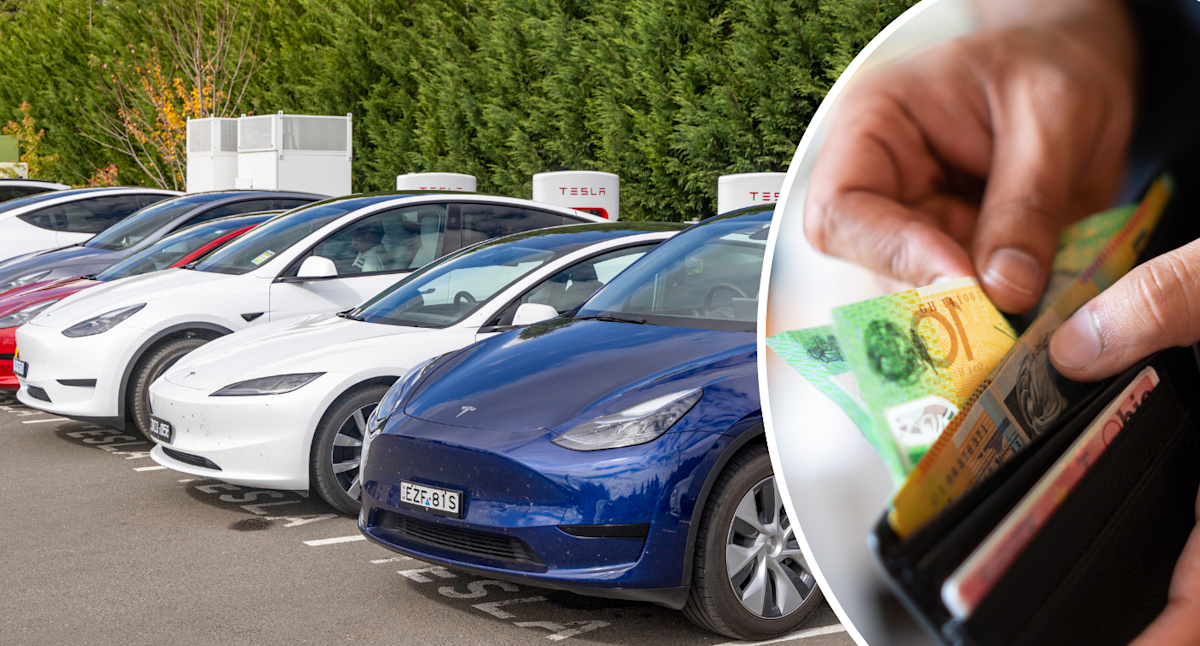EV drivers could soon be paying hundreds of dollars a year to use Australian roads. (Source: Getty)
There are fears that electric vehicle (EV) sales could be affected if a road-user charge (RUC) is introduced to level the playing field with other cars. At the moment, EVs don’t attract a tax for using Aussie roads like those in internal combustion engines (ICE).
But ahead of the government’s economic roundtable, there have been calls for EV drivers to pay their fair share with a brand new levy designed just for them. Electric Vehicle Council’s (EVC) head of legal, policy and advocacy, Aman Gaur, told Yahoo Finance it doesn’t make any sense to him why Australia would go down this path.
“The simple principle around taxes is that you tax the things you don’t want to see, like smoking or alcohol,” he said.
“Why are we taxing something that is actually trying to make Australia and the country safer from climate change? It just seems very counterintuitive.”
Those in ICE vehicles have to pay an excise on fuel at the moment, which goes to the federal government as general revenue and can be used to fund transport infrastructure.
It raises around $17 billion a year, but that revenue stream could start to go on a downward trend if more people buy EVs and don’t pay a RUC.
According to the Australian Automobile Association, one in 10 cars sold in the June quarter in Australia was an EV, which is a new record.
The EVC said a RUC for electric cars shouldn’t be introduced until that statistic hits at least three in 10 vehicles sold.
Prime Minister Anthony Albanese acknowledged there needed to be a shakeup in the system to account for the rise of battery-powered vehicles.
“We need money to ensure that roads are adequate, and that is a long-held belief,” he said this week.
“What we need to do is to work those issues through and to come up with a realistic plan that can be implemented. And we’ll await those discussions.”
Do you have a story? Email stew.perrie@yahooinc.com
That hasn’t been hashed out yet, and will form part of the discussions at next week’s productivity and economic roundtable.
“We haven’t settled on a model or on timing when it comes to that change, but clearly a government of either political persuasion will need to make changes there because the excise take on petrol will come down as petrol vehicles exit the fleet,” Treasurer Jim Chalmers said this week.
Story Continues
He added “people shouldn’t anticipate that there will be a change very soon”.
Instead of EVs having their own type of RUC, Gaur told Yahoo Finance there should be a universal road tax applied to every vehicle.
This was supported by EV motoring expert Toby Hagon, who said electric car drivers needed to start paying their way, but not with their own unique levy.
EVC’s Aman Gaur (left) and EV Central’s Toby Hagon (right) believe there should be a universal road tax applied to every car on the road. (Source: LinkedIn/EV Central)
“I’m not sure why we would treat EVs any differently to any other car on the road; we should be taxing them all equally,” he told Yahoo Finance.
“Don’t just single out EVs or hybrids or plug-in hybrids. Apply a road user charge across the board and get rid of fuel excess. It seems like a logical way to do it.”
Hagon suggested a possible RUC scenario of 3 cents per kilometre driven.
The latest data found the average Aussie drives around 12,100 kilometres per year, meaning EV motorists could be paying around $363 each year under Hagon’s prediction.
Comparatively, the fuel excise is currently 51.6 cents per litre of petrol or diesel, and, according to Compare the Market data from last year, a typical household pays around $3,200 a year in petrol or diesel.
A poll of more than 2,500 Yahoo Finance readers found 64 per cent would avoid buying an EV if they had to pay for a road tax.
But Hagon said an RUC should not influence a person’s decision-making if they’re looking for a new car.
“The running cost of an EV is so much lower than $363 a year, so it’s not going to be the determining factor of whether someone buys an EV or not,” he said.
When you compare that $3,200 per year cost for ICE car drivers, an EV owner is typically only paying around $701 per year for charging.
Electric car drivers could soon have to pay to use Australian roads. (Source: Getty) · James D. Morgan via Getty Images
Gaur said there is a much bigger potential cost than a possible $363 yearly charge to contemplate.
“To the person who’s thinking about their next car, think about your children, think about your own lifestyle, and what is the best way to keep Australia safe from the effects of climate change,” he said.
Scott Maynard, the Australian boss of Swedish EV maker Polestar, said Australia needs to make sure that whatever direction it goes in with an RUC that it makes sense for everyone.
“Driving is an essential activity, so it’s important the government has a clear understanding of what it would be seeking to achieve with a road user charge,” he said.
“Only when we understand that question can a framework be developed, and commentary applied.
“I don’t think any driver, electric or otherwise, will have an issue with a road user charge system to replace fuel excise as long as it is fair and equitable.”
Get the latest Yahoo Finance news – follow us on Facebook, LinkedIn and Instagram.

